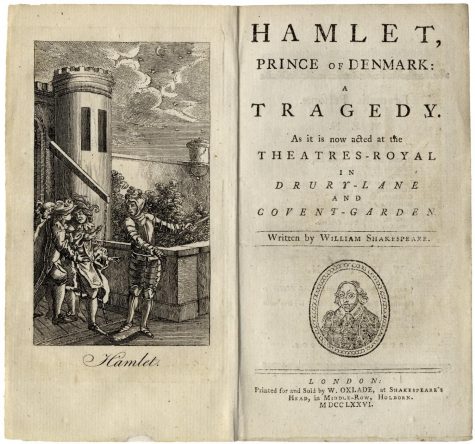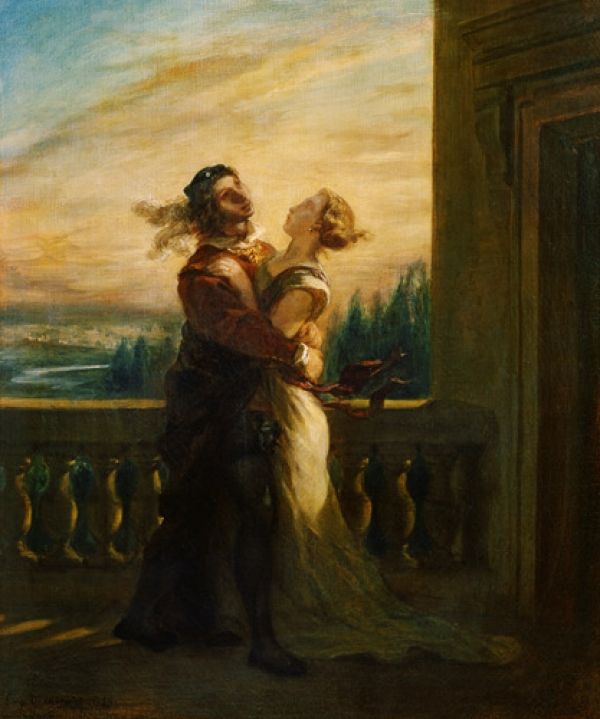The Superior Shakespeare Play: Romeo and Juliet or Hamlet?
*Contains spoilers*
Romeo and Juliet Farewell Painting
February 26, 2021
*Trigger warning: This article discusses sensitive topics such as suicide and death*
If you’ve ever read, or watched, one of Shakespeare’s plays, chances are it was either Romeo and Juliet or Hamlet. Even if you’ve never read them, you have likely at least heard of them.
Romeo and Juliet is his most well-known, and arguably most loved, work. However, does most well-known automatically mean that it is his best? Before I start comparing the two and ultimately deciding which is better, I would like to admit something.
At first, I hated Romeo and Juliet. I read it the way many people describe it as: a romance story. I thought how is it romantic that two supposedly lovestruck teenagers that just met both died trying to fight their childish parents’ rivalry? I couldn’t understand why people liked it so much. Of course, Shakespeare is an amazing writer, but I just didn’t feel connected to the plot at all. That was until I stopped taking it so seriously. If you read Romeo and Juliet without expecting it to be a love story, you will enjoy it so much more. It is meant to be funny, and it is meant to show how immature adults led to multiple deaths.
Now, continuing onto the comparison.
Both plays have a lot of death. That makes sense. It’s Shakespeare, and they’re both tragedies.
In Romeo and Juliet, six people died: Mercutio, Tybalt, Lady Montague, Paris, Romeo, and Juliet. In Hamlet, Polonius, Rosencrantz and Guildenstern, Ophelia, Laertes, Gertrude, King Claudius, and Prince Hamlet die. Prince Hamlet’s father had died before the start of the play.
While the circumstances of death in each play are quite different, both have underlying themes of betrayal and deception. Also, in Romeo and Juliet, both Romeo and Juliet committed suicide, and in Hamlet, Ophelia committed suicide.

I found that the circumstances regarding the majority of the deaths in Hamlet were more enticing and ever-connected in a web of lies, betrayals, and confusion. The death that resonated with me the most was Ophelia’s.
Ophelia’s death was the most tragic, and yet she got the least justice for what she went through. She is the only one who died throughout the play that was completely innocent. Every other person who died played some role in another’s demise, but Ophelia was simply a pawn in everyone else’s game. She was controlled by her father, by her brother, and by Prince Hamlet.
She went mad for the exact opposite reason Prince Hamlet did, and ultimately used it as a way to escape the hurt she underwent. It is arguable whether or not Ophelia actually committed suicide, but no one pushed her into the creek and she did not seem to make any effort to stay alive. Maybe her madness prevented her from even understanding that she was dying, but her will to live was not apparent.
As a reader, the treatment of Ophelia and her death was upsetting and angering. Why did many of the male characters, such as Prince Hamlet and Claudius, get served justice for their actions whilst Ophelia was cast aside?
Of course, mistreatment of female characters is a common theme in literature and film that even continues modernly. Though Ophelia’s fate is slightly infuriating, it does draw you more into the play and it is the beginning of the mass death that occurs in Act 5.
In Romeo and Juliet, the deaths seemed a bit more predictable. Of course, that is sort of the point. Two star-crossed teenage lovers with parents who hate the other’s family are not likely to make it. I suppose they ultimately did end up together, but not in the way they wanted. I think that Romeo and Juliet ended exactly the way it had to. It was sad, and not particularly the perfect model of romance or love working out, but it wouldn’t have made sense for the events to turn out in any other way.
ERHS student Ashley Nguyen noted that she likes Romeo and Juliet because “it’s just a classic and it’s so easy to understand” and it contains “a lot of common tropes” such as “star-crossed lovers and love at first sight, and also going as far as death to be with the one you love.” She added that “nowadays you don’t see that kind of love as much so that kind of drama is really interesting.”
That is certainly true, as romance nowadays focuses less and less on love. That sort of devotion to someone isn’t as common, and it is enjoyable to read and become engrossed in.
In terms of comedy, both are pretty funny. Puns and innuendos are peppered throughout both Hamlet and Romeo and Juliet, but Romeo and Juliet ultimately takes the cake with more recognizable and deliberate puns.
For the plot overall, I was more interested in Hamlet. I am a sucker for romance, but more for the ones that actually work out. Romeo and Juliet was almost entirely focused on their relationship, and in the end it doesn’t end up working out. Hamlet had a lot more separate conflicts that all seemed to come together and cause an explosion right at the end of the play.
I enjoyed reading both plays, but I do have a favorite. Overall, I think that Hamlet is a better play than Romeo and Juliet, and if you are going to read one of Shakespeare’s plays it should be that one.
I asked my younger brother Nicholas Blake, who hasn’t read either, which sounds more interesting to him. He said “Romeo and Juliet seems a lot more classic and a lot less jarring.” He continued that “Hamlet has too many elements to it, and I prefer a simpler storyline.”
If you are completely new to Shakespeare, perhaps Romeo and Juliet will be easier to read and comprehend for you, but I definitely recommend you read Hamlet after you have gotten used to Shakespeare’s style. Both are incredible, and I am sure you will enjoy reading them at least a little.



Brianne Leber • Feb 26, 2021 at 10:57 am
Ah! I love this article!! There is so much to unpack with both of these tragedies especially viewing Romeo and Juliet as dumb teenagers who are caught up in fancy rather than love. Hamlet is my favorite of the two and I will die on the hill that Hamlet is funnier than R&J. Nothing can beat when Prince Hamlet is in the throne room and says how he wishes his “too too solid flesh would melt, thaw and resolve itself into a dew!”
If someone wants to get into Shakespeare but doesn’t want to start with R&J, I recommend King Lear. I read it for my AP Lit class and thought it was hilarious and a lot easier to understand than Hamlet. Also totally watching rather than reading the plays. If its not for class, I love the David Tennant versions of Shakespeare.
Melissa Funderburk • Sep 10, 2024 at 9:11 am
I just ordered a book on Shakespeare on all his play works through thriftbooks great book site.